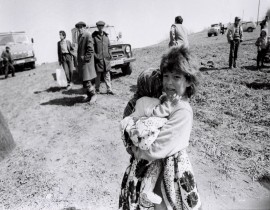Politicon.co
Black List for Black Garden
|
Visits of foreign citizens to Nagorno-Karabakh without the permission of Azerbaijani authorities raise concerns and questions on Azerbaijan`s black list from time to time. Debates on the necessity of the list of people declared personae non-grataerus in Azerbaijan because of their visits to Nagorno-Karabakh come up from time to time. What is Nagorno-Karabakh Conflict? The ethnic clashes between Armenians and Azerbaijanis living in Nagorno-Karabakh[1], a mountainous province inside Azerbaijan, arose in 1988 towards the end of Soviet rule. The conflict of a local scale turned into a full bloody war between newly independent Armenia and Azerbaijan after the collapse of the Soviet Union: Azerbaijan tried to maintain its control over Nagorno-Karabakh, while Armenia backed the separatist movement of ethnic Armenians in the region. Although Azerbaijan was admitted to the United Nations with its Soviet-time territory that included Nagorno-Karabakh, the Armenian side managed to occupy both the province and the adjacent districts and proclaimed the so-called Nagorno-Karabakh Republic. As a result of the conflict, which cost more than 30,000 lives, nearly one million Azerbaijanis got expelled from their homes in the occupied territories and still dwell as refugees in their own country. The Russia-brokered negotiations secured a truce in 1994 and ceased the hostilities between Armenia and Azerbaijan but failed to create a way forward. Controlled by Armenian separatists Nagorno-Karabakh has maintained de facto autonomy since the cease-fire, while the region is internationally recognized as part of Azerbaijan. The Minsk Group, a special body of the OSCE, established in 1997 with the aim of finding a peaceful solution to the Nagorno-Karabakh problem has initiated several proposals and organized direct meetings of Armenian and Azerbaijani presidents. Yet any attempts to fully regulate the conflict have failed: Baku has repeatedly offered a high autonomy for Nagorno-Karabakh within Azerbaijan`s territorial integrity, while the Armenian side demands independence for the breakaway region. Cross-border violence has remained constant in the two decades since the 1994 cease-fire and has been claiming dozens of lives of both military and civilians annually. What is Black List about? At present, the de facto control over the region belongs to the Armenian separatists, whose self-declared the Nagorno-Karabakh Republic continues to function as an unrecognized state. However, as Azerbaijan always considers Nagorno-Karabakh its part (so do all international documents), the official Baku wants to exercise control over entry and exit issues related to the occupied territories. The Azerbaijani authorities do not welcome any visit to the occupied territories (referred to as “the areas, which are temporarily out of control of the Republic of Azerbaijan) by foreign citizens without the official permission of Baku. Therefore, for Azerbaijan, entering these territories through Armenia (which usually happens) is a violation of its visa and migration policy. Foreign citizens who enter these territories are likely to be permanently banned from entering Azerbaijan and be included on the list of people declared personae non-gratae by the Ministry of Foreign Affairs of Azerbaijan. The official warning on this matter is posted on the website of the Ministry. The Azerbaijani authorities also advise foreign nationals to refrain from visiting Nagorno-Karabakh, by pointing out to the state of war, human trade, weapon smuggling, drug production and transit and preparation of terrorists in the above-noted region. According to the spokesperson of the Ministry of Foreign Affairs of Azerbaijan, most visits to Nagorno-Karabakh are organized by the Armenian authorities and diaspora, while a majority of foreigners are taken to the Armenian-controlled areas thinking they are still in Armenia. The most updated list dated April 2015 contains over 400 people -- not only politicians and journalists but also celebrities, such as prominent Spanish operatic soprano Montserrat Caballe, who visited Nagorno-Karabakh in 2013, Singaporean pianist Abigail Sin Si Ern, Austrian conductor Ernest Hoetzl, Swiss astronaut Claude Nicollier, Romanian poet Marius Chelaru, former Italian football player Salvatore Schillaci. However, there have been cases when persons visited the occupied territories of Azerbaijan after formally appealing to the Azerbaijani authorities and obtaining the appropriate permit. Those, who received the consent of the Azerbaijani side, have not been blacklisted. Moreover, the black list is flexible as noted by spokesman of the Azerbaijani foreign service, who also explained the procedure of removing someone from the black list: if the person repents his/her action and sends a formal request to the relevant bodies of Azerbaijan, the request will be considered. The likes of Italian pop star Al Bano, Russian politician Alexei Mitrofanov, and member of the German Parliament Jürgen Klimke were excluded from the list after expressing regret for illegally visiting Nagorno-Karabakh. A recent and interesting case did happen in regard to famous Russian designer and traveler Artemy Lebedev, who was removed from the list in February 2015 after sending a letter of apology to the Azerbaijani ambassador to Russia. In his LiveJournal account, he referred to his visit to Nagorno-Karabakh as “a stupid act” and asked the Ambassador to pardon him: “Uncle, forgive the foolish guy”. What do they say? Some politicians and reporters, mostly who visited Nagorno-Karabakh and eventually became blacklisted, criticize this policy. For example, Russian political expert Konstantin Zatulin, who repeatedly traveled to Nagorno-Karabakh to observe elections in the self-declared state, noted that “Azerbaijan demonstrates silliness” by having such a list, while his colleague Sergey Markedonov sarcastically expressed his happiness to have joined the company of Caballe and other celebrities. The senior fellow for Europe and Eurasia at the American Foreign Policy Council, Wayne Merry, condemned Baku`s black list and said that “this step, first of all, harms the Azerbaijani authorities” and it is a “striking example of self-isolation and simple policy.” Another blacklisted traveler, Israel-based Alexander Lapshin, whose travelogues are quite popular among Russian-speaking Internet users, commented that Azerbaijan may lose thousands of potential tourists because of such an approach. Visits of foreign citizens to Nagorno-Karabakh are not welcomed in Azerbaijan, while trips to the occupied territories paid by politicians, officials and members of parliament of different countries raise more negative opinion among Azerbaijanis, who accept them as a sign of double standards. However, in such cases, governments of foreign countries and international institutions usually distance themselves from those visits. For instance, when answering the diplomatic note of Azerbaijan, the Spanish Foreign Ministry stated that Montserrat Caballe`s visit to Nagorno-Karabakh does not reflect Spain`s official position based on recognizing Azerbaijan`s territorial integrity. The visit of French MPs in 2011 “does not put any responsibility on Paris and does not change its position”, the French embassy to Azerbaijan informed, while the European Parliament referred to the 2013 trip of several parliamentarians to Nagorno-Karabakh as a “personal initiative.” Similar policies in other countries? Despite furious comments of blacklisted persons, imposing a temporary or permanent ban on entry for particular persons is a usual practice all over the world. Such bans can be used as a result of visa and migratory policy, as well as political context. In Europe, overstaying a Schengen visa causes not only a fine (several hundred euro) and immediate deportation. It may have worse consequences, such as complications to obtain a Schengen visa or a ban on entry in the future. A traveler overstaying Schengen visa may not be allowed back into Schengen countries for 1 to 3 years. For example, in the Netherlands, a ban on entry can extend up to 20 years due to a prison sentence or issues of public order and national security. As written, border crossing and visa regulations exist everywhere. Add to this the violated territorial integrity of Azerbaijan and the extreme sensitivity of Azerbaijanis towards Nagorno-Karabakh, which is internationally recognized as part of Azerbaijan, then the situation could be more or less understandable. Imposing a ban on the entry of unwanted persons (mainly politicians and reporters) on political reasons has been practiced quite frequently in recent times. A few years ago, the United States and Russia swapped black lists after the Magnitsky case. In 2013, the U.S. government introduced visa sanctions against 18 persons in the Magnitsky list 18 persons because of alleged human rights abuses. In response, Russia released its own list naming 18 Americans banned from entering the Russian Federation over their alleged human rights violations. The Western-Russian confrontation over Ukraine produced mutual sanctions, including travel bans. In 2014, Ukraine, Latvia and Lithuania banned several Russian singers from entering those countries because of their public support for pro-Russian separatists in eastern Ukraine and Russia's annexation of Crimea from Ukraine. As the civil war continues in Ukraine, the Kyiv government takes counter-measures against Russian information war by disallowing some Russian reporters to enter the Ukrainian territory. In May 2015, Russia shared another black list, which includes 89 European politicians, officials and military leaders. In July 2015, Finland blocked Naryshkin’s entry into the country for a meeting of the Organization for Security and Co-operation in Europe’s Parliamentary Assembly because of his inclusion in European Union sanctions against Russia and some of its top officials. The policy of denying entry to Schengen countries was extended by Western countries not only to officials, lawmakers and celebrities but also to many common people after Russia`s annexation of Crimea. Numerous complaints came from Russians, who were unable to get a Schengen visa after traveling to the Crimea, which Russia annexed in March 2014. Moreover, the European Union instructed its embassies and visa counters of the EU member states not to issue EU visas including the Schengen visa to the Crimean citizens in Russia. The Crimean citizens can apply in Ukraine to the concerned embassy in the country to obtain a visa. EU mission will not issue any visas to Crimeans using Russian passports. The decision of banning all types of EU visas to Crimeans at the EU embassies and visa centers was made by the European Council as the EU still considers Crimea as part of Ukraine and hence decided to ban the visas. The European Union should have made a similar decision toward other breakaway regions in the CIS countries – but this is a question of another discussion.
|
[1] The prefix Nagorno- is derived from the Russian attributive adjective nagorny (нагорный), which means "highland". The name Karabakh or Qarabağ as written in Azerbaijani is made of two words: “qara” (black) and “bağ” (garden)/
![]()
- TAGS :
- Azerbaijan
- Armenia
- Karabakh
- TOPICS :
- Conflict and peace
- REGIONS :
- Russia and CIS


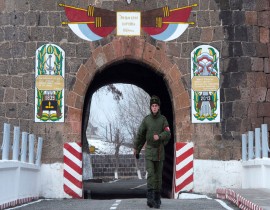
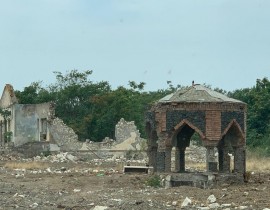
png-1748065971.png)
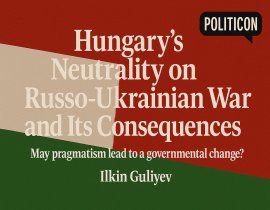


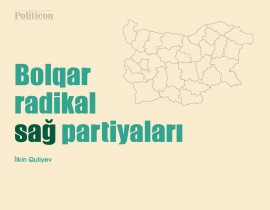
jpg-1599133320.jpg)
